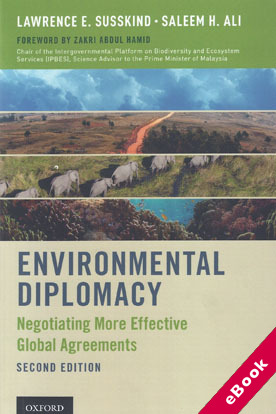We will be closed from 5pm Thursday 17th April for the Easter Bank Holidays, re-opening at 8.30am on Tuesday 22nd April. Any orders placed during this period will be processed when we re-open.

The device(s) you use to access the eBook content must be authorized with an Adobe ID before you download the product otherwise it will fail to register correctly.
For further information see https://www.wildy.com/ebook-formats
Once the order is confirmed an automated e-mail will be sent to you to allow you to download the eBook.
All eBooks are supplied firm sale and cannot be returned. If you believe there is a fault with your eBook then contact us on ebooks@wildy.com and we will help in resolving the issue. This does not affect your statutory rights.
International environmental agreements have increased exponentially within the last five decades. However, decisions on policies to address key issues such as biodiversity loss, climate change, ozone depletion, hazardous waste transport and numerous other planetary challenges require individual countries to adhere to international norms.
What have been the successes and failures in the environmental treaty-making arena? How has the role of civil society and scientific consensus contributed to this maturing process? Why have some treaties been more enforceable than others and which theories of international relations can further inform efforts in this regard? Addressing these questions with renewed emphasis on close case analysis makes this volume a timely and thorough postscript to the Rio-Plus 20 summit's celebrated invocation document, The Future We Want, towards sustainable development.
Environmental Diplomacy: Negotiating More Effective Global Agreements provides an accessible narrative on understanding the geopolitics of negotiating international environmental agreements and clear guidance on improving the current system.
In this book, authors Lawrence Susskind and Saleem Ali expertly observe international environmental negotiations to effectively inform the reader on the geopolitics of protecting our planet. This second edition offers an additional perspective from the Global South as well as providing a broader analysis of the role of science in environmental treaty-making. It provides a unique contribution as a panoramic analysis of the process of environmental treaty-making.